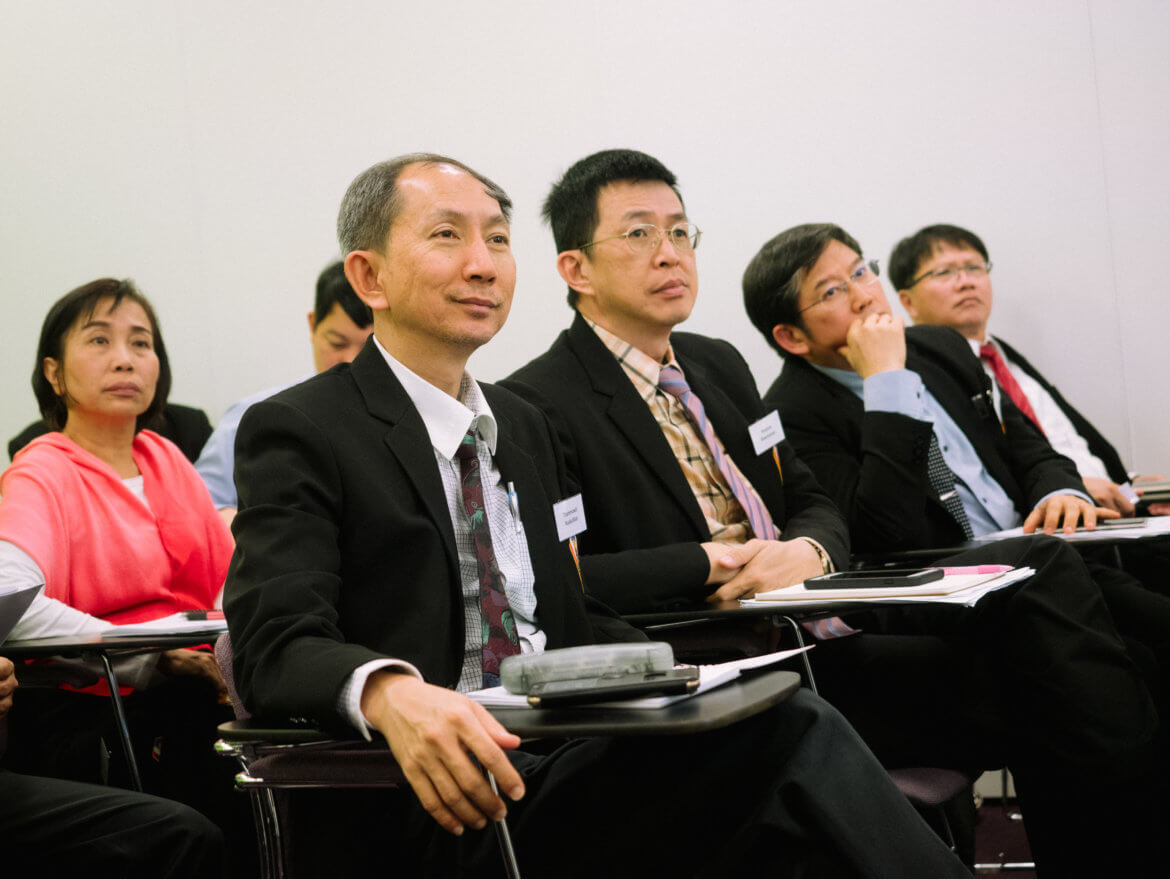A delegation from Thailand’s Ministry of Public Health (MoPH), hosted by Imperial’s Global Health & Development team, visited London and Warwick this month to learn about healthcare in the UK.
Like many countries, Thailand is plagued by the ‘modern epidemic’ of non-communicable diseases (NCDs), responsible for 70 per cent of deaths worldwide. Nearly three-quarters of these deaths occur in developing countries, four out of five of them prematurely. The prevalence of NCDs is increasing and requires actions across social, economic and health sectors for prevention and control.
Across three days the delegation of 23 senior officials heard presentations on health promotion policy in the UK with a focus on NCD prevention and control. They also learned about the role of GPs and local health authorities which included field visits to a cutting-edge GP-led service in the heart of Coventry; and a GP Alliance aiming to give patients access to a wider range of services locally.
Speakers included National Clinical Director for Stroke Professor Tony Rudd CBE, who focused on how those with key stroke and cardiovascular disease (CVD) risk factors are identified and
managed within NHS general practice. Professor Rudd, who was a clinical expert for the iDSI’s work on stroke Quality Standards in Vietnam, explained how solutions for prevention of stroke and CVD in the UK include NHS Health Checks (invites for those between the ages of 40 and 74 for a free check-up of their overall health) and expanding the role of pharmacies.
With the number of stroke patients in Thailand constantly increasing, Dr Tawekiat Boonyapaisarncharoen, a senior advisor to the MoPH Thailand, who led the delegation, said the public health officials were keen to learn more about how these figures can be brought down. Dr Boonyapaisarncharoen said: “Professor Rudd’s presentation was extremely valuable as stroke remains one of the biggest killers in Thailand. We know many strokes are preventable through lifestyle changes, including eating less salt and not smoking, however we were eager to gain knowledge about prevention systems that have proved successful here in the UK that we may be able to initiate in Thailand.”
Dr Ryan Li, Advisor for the International Decision Support Initiative and Imperial’s Global Health & Development team, gave an overview of the NHS to the delegation; and an introduction to Quality Standards for public health in the UK and the role of National Institute for Health and Care Excellence (NICE). Krisana Sirivibulyakiti, Director of the College of Public Health Administration in Thailand, said: “Dr Li’s presentation on how the NHS operates was so informative for all of the delegation. In Thailand we have a system providing universal health care for Thai nationals however it was interesting to hear the history and structure of the NHS; and how it operates as a national ‘insurer’.”
During two days at Imperial’s Hammersmith campus the delegation also heard from Professor Antony Morgan on how the UK is adopting an evidence-based, social approach to guidance on the prevention of harm from alcohol; and details on implementation by NICE.
Dr Boonyapaisarncharoen, who was Director General Health Inspector at MoPH and has also worked as Provincial Chief Medical Officer in Thailand, said: “I was particularly impressed hearing about NICE; and how numerous experts work together, bringing different expertise, to produce evidence-based guidance. In Thailand health policies are produced in the same way, however this often is the work of just one expert, or politicians who do not always have high-level knowledge or experience in these areas. I would like to see the work the Health Intervention and Technology Assessment Program (HITAP) do in Thailand to develop much further to be on the same level of NICE here in the UK.”
Professor Neil Squires, Director of Global Health at Public Health England (PHE), gave an overview of PHE’s global health strategy and was followed by talks from colleagues Dr Tazeem Bhatia, Nick Clarke, Jo Locker, Slade Carter and Ian Walker who showcased the work PHE has carried out to encourage physical activity, tackle CVD, reduce tobacco consumption and improve access to mental health services.
Krisana Sirivibulyakiti said: “It was great to hear the strategies Professor Squires and his team have implemented to try and encourage the UK public to be healthier and reduce the difference between the health of different groups through promoting healthier lifestyles, advising government on policy and looking at collected data to better understand problems and suggest answers. Many lifestyle choices combined can contribute towards a serious health issue, heart disease for example, this is a problem that exists globally and not just in the UK, so hearing the PHE team speak was of huge assistance to us.”
The delegation made their way to Warwick Medical School on the final day of their tour, where they were welcomed by the Dean, Professor Sudhesh Kumar. The officials were hosted on their day at Warwick by Professor Paramjit Gill who is both a Professor of General Practice at the University of Warwick and a practicing GP in Coventry.
The delegation was especially keen to learn about the Quality and Outcomes Framework (QOF), the NHS voluntary reward and incentive programme for GP practices in England. The scheme recognises quality of care practices provide to their patients and helps standardise improvements in the delivery of primary care, the results of which are published every year. Visit F1000 to read iDSI’s paper on Pay-for-performance in resource-constrained settings: Lessons learned from Thailand’s Quality and Outcomes Framework.
Professor Gill, who has previously worked with the Thai Ministry, said: “The visit was a great opportunity to highlight the great work being done by the NHS in the UK and to explain the challenges our health service faces. It was also an opportunity to tell the delegation about some of the research and teaching that takes place at Warwick Medical School.”
After visiting Warwick Medical School the delegation were taken on a tour of the City of Coventry Healthcare Centre; a purpose-built building offering phlebotomy, pharmacy, physiotherapy, dental and sexual health services which also has four GP practices, over its five floors; and to the Coventry & Rugby GP Alliance.
Dr Boonyapaisarncharoen said: “The importance of integration between public health and social care is clear following our UK visit. A health system should aim to encompass an entire range of care – from health promotion to disease control, medical care and rehabilitation services; with family physicians as team leaders to provide institution-based treatment that is linked to community-based care.”
MOPH Thailand oversees all public medical services provided to the Thai population and is one of the largest government ministries. It oversees over 20 different government healthcare agencies and responsible for over 800 hospitals.
Dr Boonyapaisarncharoen said: “On behalf of the delegation I would like to extend my thanks to the teams at Imperial and Warwick who organised such an inspiring trip for us. We have gained a lot of knowledge into health systems and strategies in the UK, some of which we hope to explore further to potentially instigate in Thailand in our quest to tackle NCDs. There are so many learnings we can take back to Thailand with us.”
A summary report of the visit was presented to the Minister of Public Health yesterday, 19 March 2018.
iDSI Associate Director Dr Francoise Cluzeau, who opened the first day of meetings for the delegation and accompanied them to Warwick, said: “We were delighted to welcome MoPH Thailand. This collaboration has demonstrated how valuable it has been to share knowledge and expertise and we hope they gained a better understanding of health promotion policy in the UK. We look forward to developing our relationship with Thailand even further following their visit.”
iDSI has a long standing relationship with Thailand, via one of our core partners – HITAP, a research institute of the Thai Ministry of Public Health. HITAP’s work to date has been used to inform policy decisions regarding the adoption of medicines, medical devices and public health programmes under the Universal Health Coverage scheme and the national pharmaceutical reimbursement list.


